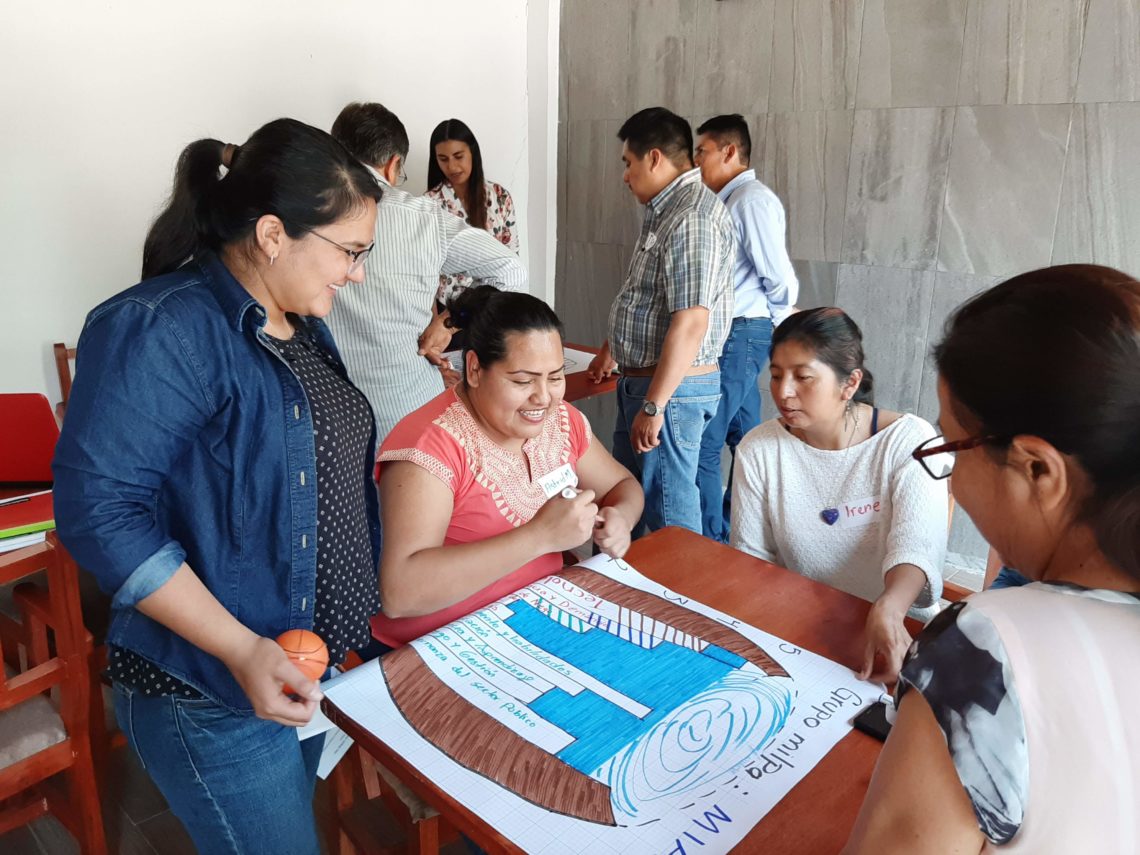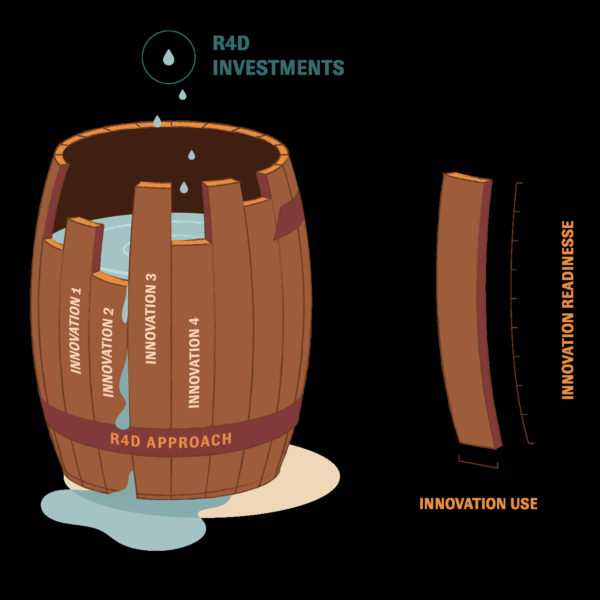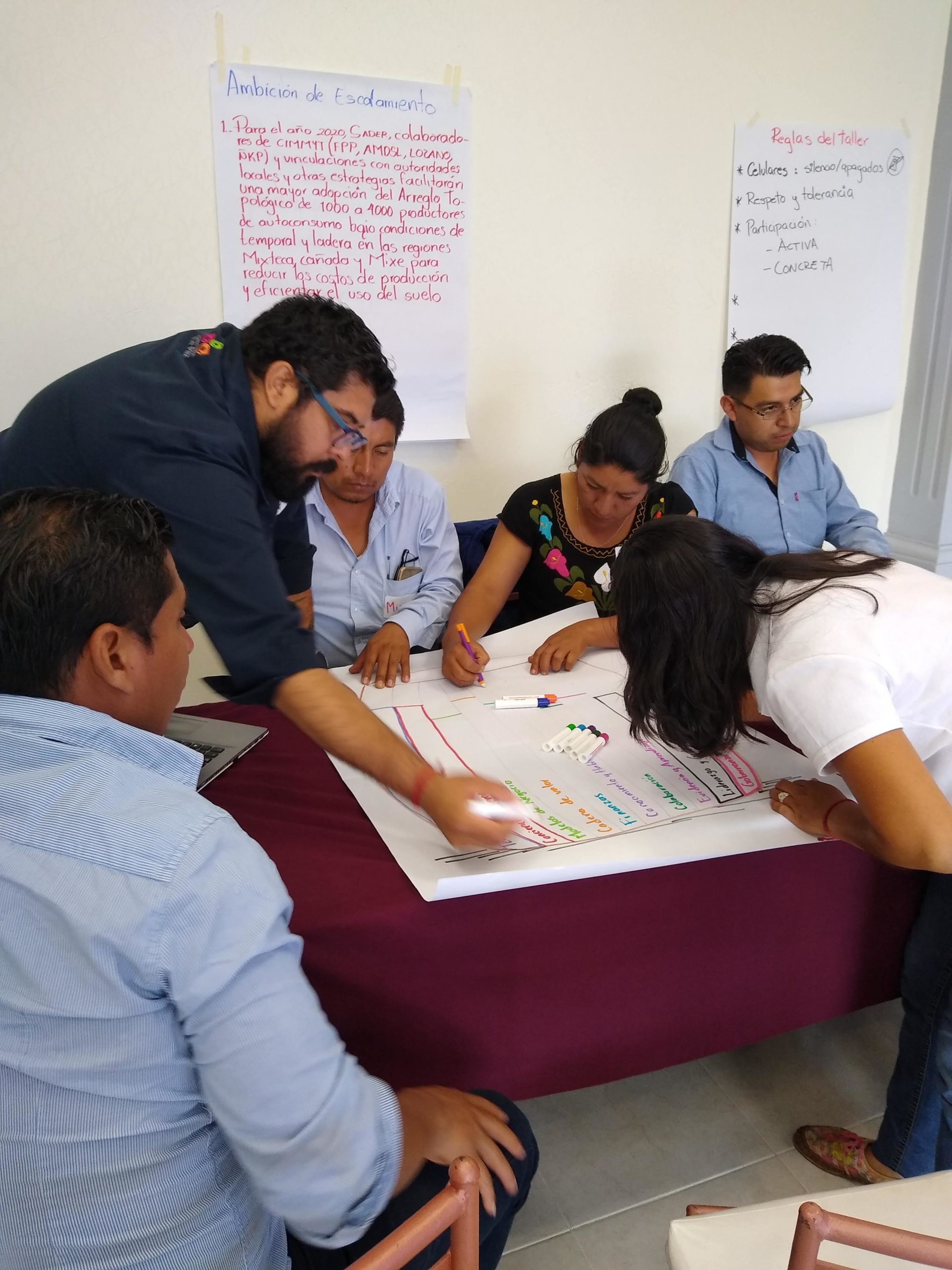
Maria Boa, scaling advisor at CIMMYT, helps extension agents in Chiapas, Mexico, make sense of scaling using the Scaling Scan tool. Photo credit: Lennart Woltering/CIMMYT
Scaling innovations has become a top priority in One CGIAR. This means to enable the use of innovations (including products, services, technologies, capacity development, and policies) to have a positive impact on many people across broad geographies. “Securing more rapid uptake of science-driven innovations where they are most needed” is central to the One CGIAR process which takes a unified approach to transform food, land, and water systems to feed the world’s growing population in a sustainable manner. Scaling is important for ensuring sustainable and equitable benefits in low and middle-income countries. It also creates learning opportunities for scientists to improve the quality and relevance of their research.
To promote best practice and embed state-of-art thinking about scaling in One CGIAR design and development processes, four Scaling Web Conferences were jointly organized in 2020 by members of the CGIAR Science Leaders community, the CGIAR System Management Office, CGIAR scaling specialists, and the GIZ/CGIAR Task Force on Scaling.
Featuring speakers from within and outside CGIAR, the conferences, held between July and November, set out to clarify CGIAR’s role in scaling rigorously tested innovations and identify ways of incorporating the learning into the design of future research programmes. They also highlighted opportunities and challenges for transforming food systems and underscored the importance of designing scaling strategies that are inclusive, for example in terms of gender, age, and other sources of social diversity.
Graham Thiele, Director of the CGIAR RTB research program explained: “Considering the critical role of scaling in One CGIAR, and the opportunity to include and embed our learning in initiatives being designed, we developed four briefs through collaborative work amongst all the participants.” The first brief – Scaling Web Conference Series with the CGIAR Science Leaders – sets out the rationale for embedding scaling strategies in the design of research for development programs. Brief 2, Scaling Principles, offers a framework of actionable principles based on established scaling guidelines. Brief 3, Scaling Approaches and Tools, outlines key features of selected scaling tools and approaches and lists additional resources for scaling and food system transformation and Brief 4 provides a Scaling Glossary for a unified terminology for programming scaling activities and improving collaboration of scaling teams.
One central topic of the conferences was the distinction between research, developing innovations, and scaling them. “Having a well-performing innovation is important, but not sufficient,” said Lennart Woltering, Scaling Catalyst at the International Maize and Wheat Improvement Center (CIMMYT) and member of the GIZ/CGIAR Task Force on Scaling. “Scalability is largely dependent on the context – is there a demand? Are there incentives for other organizations, companies, governments to scale the innovations? Are they putting in their own resources and political capital? Are policies and regulations conducive to bridge supply and demand?”
The conferences showcased experiences of scaling in CGIAR including the International Livestock Research Institute (ILRI)’s Impact at Scale initiative, a scaling framework that was developed to drive the scaling-up of proven approaches and interventions across all ILRI programs in 16 African and Asian countries. Others included CGIAR GENDER Platform cases to achieve inclusive scaling and the HarvestPlus program for experimenting with diverse scaling approaches in Catalyzing the Scale-Up of Crop Biofortification. The GIZ/CGIAR Task Force on Scaling explained how its interdisciplinary team of CIM-Integrated Experts, launched by German development agency GIZ with members from a wide range of professional backgrounds, is working to accelerate the large-scale uptake of viable innovations.
“There are several reasons why scaling principles and tools/approaches are not being used as intensively in scaling initiatives as they should be,” said Steffen Entenmann, GIZ Advisor and Coordinator of the Task Force on Scaling. “Reasons may include that researchers and program managers are not aware of actionable guidance that corresponds to their specific needs. One of our intentions was therefore to provide useful, convenient, and readily available guidance and resources for scaling managers and practitioners.”
“Most CGIAR innovations target smallholder farmers or small-scale businesses in the food system, both of whom face numerous challenges in adopting technologies, such as access to information, credit, and markets for inputs and outputs. The more technologies are affected by these challenges, the less scalable they will be,” said Frank Place, Director of the Policies, Institutions, and Markets CRP, who contributed to the brief on approaches and tools for scaling. He also underlined that “Some of the tools generated by CGIAR scientists help researchers to identify the major constraints to scaling and steer them towards developing appropriate strategies that may combine efforts to circumvent these difficulties in the short term, as well as addressing them in the medium to long term.” Examples of scaling tools and approaches developed by CGIAR include the stage-gating, Scaling Readiness, and Scaling Scan approaches, and the Projected Benefits Analysis Tool.

Scaling Readiness Barrel to illustrate how innovation with the lowest readiness limit an innovation package’s capacity to achieve impact at scale: source: Murat et al. 2020
The conferences were a key learning experience for RTB and led to mature reflections about the RTB experience in scaling. A key target established by One CGIAR is for 100 million farming households in developing countries to have adopted CGIAR technologies by 2022. “It’s gratifying and reassuring to see the challenges and dynamics of scaling being so thoughtfully embraced as part of the One CGIAR effort.” Larry Cooley, President Emeritus of Management Systems International and co-founder of the Global Community of Practice on Scaling Development Outcomes. To reach that objective, prior to developing methods and strategies for increased uptake of viable solutions, it will be critical to assess which innovations have the best prospects for scalability and the strongest potential for impact at scale. That is because not all agricultural innovations are suitable candidates for wider adoption. For example, some may not be sufficiently cost-effective, while others may be too knowledge-intensive to have a practical application.
A priority when deciding on interventions to be scaled up must be to evaluate whether or not increased adoption will result in positive outcomes, and weigh up the likelihood of any unintended impacts, especially on vulnerable groups. Ensuring that all solutions are grounded in the real needs of stakeholders, and are closely aligned with their practices, beliefs, aspirations, and budgets, will increase the likelihood of their enduring in the longer term, once assistance has been withdrawn. Another key aspect for selecting high-readiness innovations is to use evidence for assessments. CGIAR is a research organization that needs to spearhead the use of evidence and data not only in developing innovations but also in scaling them.
Building on the collaborative learning and state-of-art approaches and tools in scaling, and cognizant of the realities of scaling innovations in CGIAR, RTB has developed its own scaling team with Wageningen University & Research, supporting the use of Scaling Readiness to enhance the impact of RTB crops on sustainable livelihoods. Across CGIAR, a significant number of scientists have expressed their commitment to scaling the impact of innovations on food security and rural poverty by becoming active members of the Global Community of Practice on Scaling Development Outcomes’ Agriculture and Rural Development Working Group.
—
Brief 1: Scaling Web Conference Series with the CGIAR Science Leaders – sets out the rationale for embedding scaling strategies in the design of research for development programs.
Brief 2: Scaling Principles, offers a framework of actionable principles based on established scaling guidelines.
Brief 3: Scaling Approaches and Tools, outlines key features of selected scaling tools and approaches and lists additional resources for scaling and food system. transformation
Brief 4: provides a Scaling Glossary for a unified terminology for programming scaling activities and improving collaboration of scaling teams.
